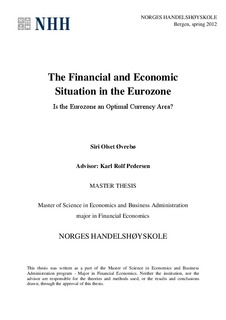| dc.description.abstract | This thesis examines whether the Eurozone forms an optimal currency area by analyzing each of the 17 member countries’ contribution to increased wealth for the Eurozone. Furthermore, how the member countries have been affected by losing their national monetary policy when entering the Eurozone, in form of increased volatility in inflation and output, unemployment and fiscal situation.
The results of the analysis suggest that without Greece, the remaining member countries would have formed a better currency area, and that Ireland is the only country that tends to have net costs from the introduction of the euro and the loss of its national monetary policy. The analysis is followed by a brief discussion of different scenarios for the Eurozone; a break-up, no-change and an adapt-to-succeed view, which includes suggestions of measures of structural improvements for the Eurozone, e.g. centralized budgets with Eurobonds or restructuring the Eurozone into a complete political union. | no_NO |
